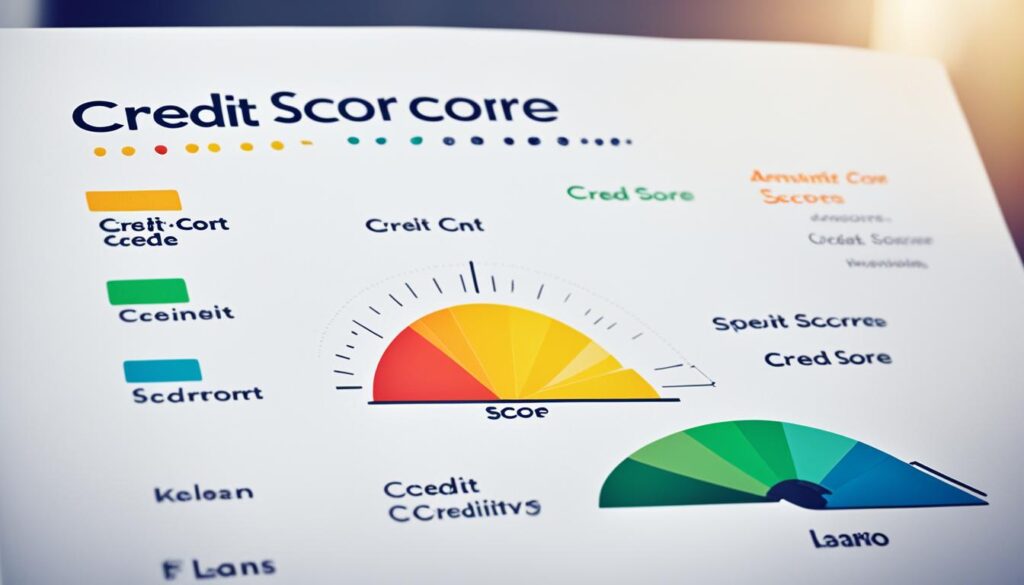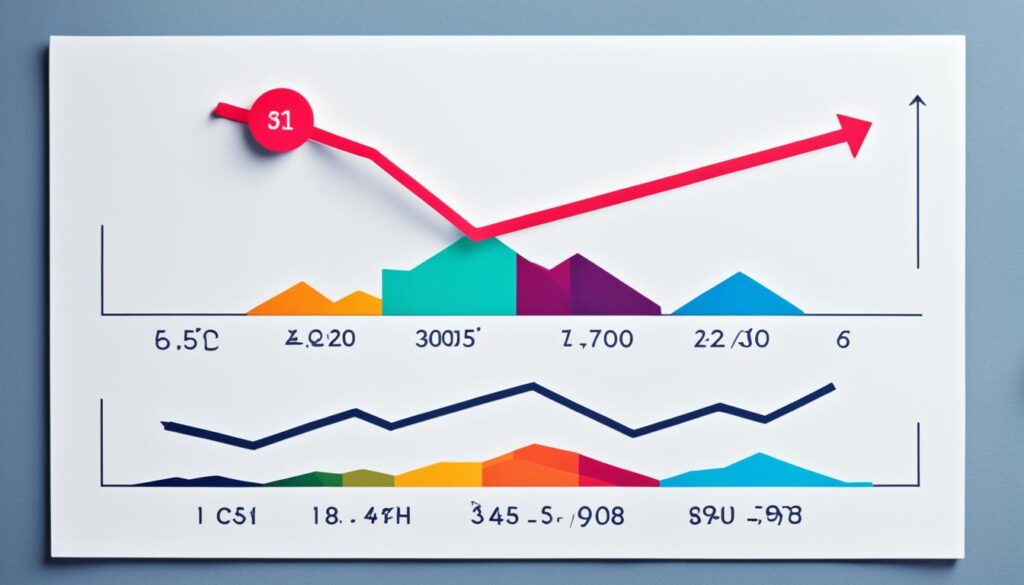Welcome to our guide on understanding credit scores! These are three-digit numbers that show how likely you are to pay back a loan. They are very important for getting loans and the interest rates you get. In this article, we will explain how credit scores work. We will also share tips on improving your score. Plus, we’ll show why a good credit score is key for your finances.

Key Takeaways:
- A credit score is a three-digit number that reflects your creditworthiness.
- Lenders use credit scores to make decisions about loan approvals and interest rates.
- To improve your credit score, focus on making payments on time and reducing credit card balances.
- Credit scores can vary between different credit bureaus and scoring models.
- Monitoring your credit score regularly is important for maintaining financial health.
FICO Score vs. VantageScore
When we talk about credit scores, two big names come up: FICO Score and VantageScore. It’s key to know how they differ and affect your credit.
The FICO Score comes from the Fair Isaac Corporation. It’s been the main choice for many years. This score ranges from 300 to 850. A higher score means better credit. There are unique models for Experian, Equifax, and TransUnion scores.
VantageScore is the effort of the three credit bureaus working together. They use one model for all. Just like FICO, its scores range from 300 to 850.
Both scores use the same range, but they might see your credit differently. Each has its way of measuring how creditworthy you are. That’s why keeping an eye on both scores is smart.
They both look at things like your payment history and how much credit you use. They also consider how long you’ve had credit, any new credit, and the types of credit you have. But, they might not give the same importance to each factor.
To understand your credit standing, it’s wise to know how FICO Score and VantageScore differ. Watching both helps you grasp your credit health better. This can guide your decisions with credit or loans.
| FICO Score | VantageScore |
|---|---|
| Developed by Fair Isaac Corporation | Collaboratively created by the three credit bureaus |
| Range of 300 to 850 | Range of 300 to 850 |
| Separate models for each credit bureau | Single model used by all three bureaus |
| Factors in payment history, credit utilization, credit history length, new credit, and credit mix | Considers similar factors in scoring calculations |
Why Are There So Many Different Credit Scores?
Credit scores are crucial for lenders when they check if you’re good to loan money to. But, you might wonder why your credit scores are not the same from one place to another. This happens because there are a bunch of reasons that make them different.
Credit Score Variations
Different credit scores come from using various methods to figure them out. Agencies like Experian, Equifax, and TransUnion gather your credit info. They each use their own way to calculate your score. Because they focus on different things, your score can change depending on who checks it.
Industry-Specific Models
Another reason scores change is that lenders have their own scoring systems. For instance, car loan companies might look more at your car loan history. Credit card companies have a system that looks at other things. This means your score can change based on what loan you apply for.
Credit Reporting Agencies
Sometimes, the info that these agencies gather is not the same, which leads to different scores. They all try to keep your credit data correct and full. But, they might get different info from lenders. This is why your scores can vary slightly.
The Bottom Line
“Knowing about different credit scoring methods helps you make smarter money choices. It can also improve how loan-worthy you seem.”
Seeing different scores from various places can be confusing. But, it’s important to remember that the changes are usually small. The big picture of how credit-worthy you are stays pretty much the same. To keep your credit in good shape, watch your scores, check your credit reports for mistakes, and stick to good credit habits. This will ensure your credit profile is strong no matter where it’s checked.

| Reasons for Credit Score Variations | Description |
|---|---|
| Credit Scoring Models | Different credit scoring models used by reporting agencies can lead to variations in credit scores. |
| Industry-Specific Models | Lenders may use specialized scoring models tailored to specific industries, leading to variations in credit scores. |
| Credit Reporting Agencies | Variations in the information reported by credit reporting agencies can result in different credit scores. |
What Factors Affect Your Credit Score?
Several factors can change your credit score. Knowing what these are helps you manage your credit better. Let’s look at the main things that affect your credit rating.
1. Payment History
Your payment history is a big part of your credit score, making up 35% of it. This part shows if you pay your bills on time. To have a good payment history, always pay your bills and loans by the due date. This tells lenders you are reliable.
2. Credit Utilization
Credit utilization talks about how much credit you use. It’s 30% of your credit score. It’s key to keep your credit use low. Try not to use more than 30% of your credit limit. For instance, if your limit is $10,000, keep your spending under $3,000. This shows you’re good at managing credit without depending too much on loans.
3. Credit History Length
Your credit history’s length also matters. The longer you’ve handled credit well, the better for your score. This part is 15% of your score. Building a solid credit history takes time. So, start early and keep your accounts in good shape for a long time.
4. New Credit
Applying for new credit can impact your score, making up 10% of it. Getting lots of new credit in a short time might worry lenders. They might think you’re taking on too much debt. So, think about the effect on your score when applying for new credit.
5. Credit Mix
Your credit mix is about the different types of credit you have. This could be credit cards, loans, mortgages, and more. Having a variety of credit types can help your score. This part is 10% of your score. Although a mix is good, managing your credit wisely is more crucial. Don’t borrow more than you can handle.
A Complete Table Illustrating the Credit Score Factors:
| Credit Score Factors | Weightage in Credit Score Calculation |
|---|---|
| Payment History | 35% |
| Credit Utilization | 30% |
| Credit History Length | 15% |
| New Credit | 10% |
| Credit Mix | 10% |
To manage your credit score well, know these factors. Keep up a good payment history, use credit wisely, have diverse credit types, and think carefully before getting new credit. Following these steps will help improve your score over time.

What Is a Good Credit Score?
A good credit score is vital for your financial health and getting credit. It shows lenders you’re likely to pay back loans. A score around 670 or more is usually seen as good.
Lenders use two scoring models: FICO Scores and VantageScores. They range from 300 to 850. Scores above 800 (FICO) or 780 (VantageScores) are top-notch.
Different lenders have their own views on what’s a good credit score. Some are easy-going, others are strict. They also look at your income and debt compared to income.
With a good score, you get to enjoy lower interest rates and great credit deals. It helps in renting places, getting insurance, and sometimes for jobs too.
To get a good score or boost it, pay bills on time and use less credit. Avoid lots of debt and check your credit reports for mistakes. With smart choices, you can reach and keep a high score.

A good credit score is both comforting and gives you more financial options. It’s a key to a stable financial future. By being financially wise, you can get a strong credit standing.
How to Improve Your Credit Score
Want to better your financial health? Improve your credit score. A few active steps can boost your creditworthiness. This opens doors to better loan terms and rates.
Pay Your Bills on Time
Never missing a payment is key. Timely payments show you’re financially responsible. To stay on track, set up reminders or automatic payments.
Reduce Credit Card Balances
Paying down credit card debt is crucial. Try to use less than 30% of your credit limit. This shows you handle debt well.
Maintain Old Credit Accounts
Old credit accounts boost your score. Your credit history length matters. So, keeping old accounts open helps build a strong credit profile.
Avoid Excessive Credit Applications
Applying for new credit leads to hard inquiries. Too many can hurt your score. Apply for credit only when you truly need it.
Review Your Credit Reports
Check your credit reports regularly. This helps you spot errors. If you find mistakes, dispute them. This way, you can have them removed. Request your free credit reports from the major bureaus every 12 months.
“Improving your credit score takes time and consistent effort, but the benefits are worth it. By implementing these strategies, you can pave the way to better financial opportunities.”

| Strategy | Effectiveness (on a scale of 1 to 5) |
|---|---|
| Pay Bills on Time | 5 |
| Reduce Credit Card Balances | 5 |
| Maintain Old Credit Accounts | 4 |
| Avoid Excessive Credit Applications | 4 |
| Review Credit Reports | 4 |
The Impact of Credit Scores on Loans
Your credit score affects your loan qualifications and the interest rates you get. Lenders check your credit score to see if you’re good for the money. This check helps them decide if they’ll give you a loan.
When you want a loan, lenders look at your credit score first. A high score means you’re likely to pay back on time. So, you’re more likely to get the loan.
A high credit score also means lower interest rates for you. Lenders see you as a safe bet and offer better terms. But, a low score can mean higher rates or no loan at all.
Keeping a good credit score helps with loan approval and saves money over time. Even a small change in the interest rate makes a big difference. This is true for big loans like for houses or cars.
Being smart about managing your credit improves your score. Pay on time, keep your credit card balance low, and don’t ask for too much credit all at once. Over time, these actions boost your score.
Loan Approval and Interest Rates: A Real-Life Example
“I didn’t focus much on my credit score before applying for a mortgage. Luckily, I had been careful with credit, and my score was great. The bank approved my loan quickly, and I got a great interest rate. With a lower score, it would have been harder and more expensive to get my dream home.”
Jane’s story shows how crucial a good credit score is for loans and rates. Make sure to keep up with good credit habits. This way, you’ll get better loan terms.

The Importance of Credit Scores
Credit scores are key to your financial health. They affect your chances to get credit cards and loans. A good credit score means lower interest rates and better loan terms. Plus, it can save you money on insurance premiums.
A high credit score is important. Lenders look at it to decide if they’ll lend you money. A higher score means you might get higher limits or lower rates on loans. This saves you money and helps reach financial goals.

Insurance companies also check your credit score. A good score means you’re seen as responsible and less risky. This can lower your insurance costs. You’ll save money, which can go towards other financial needs.
Your credit score changes over time. Keep a good score by being financially wise. Improving your credit score opens up more opportunities. Check your score regularly and work on any negative points.
In summary, credit scores impact your financial life deeply. They help you get better deals on loans and credit products. A good score also leads to lower insurance rates. Work on keeping a good credit score for financial benefits. It’s vital for saving money and achieving financial wellness.
Interpreting Credit Score Factors
Understanding your credit score factors is key to managing finances well. Looking into these factors reveals what affects your score. This lets you improve it proactively.
Payment history and credit utilization greatly influence your credit score, about 65% combined. Payment history shows if you pay your bills on time. Credit utilization is how much credit you use.
Credit history length, new credit applications, and credit mix also matter but less so. The age of your credit accounts shows credit history length. New credit is how often you apply for credit. Credit mix is the variety of credits you have.
Knowing these factors lets you manage your finances better. Focus on good payment history, low credit use, and a healthy credit mix to boost your score.
The Importance of Payment History
Payment history is crucial for your credit score. Lenders want to know you pay on time. Missed payments or defaults hurt your score and make borrowing hard.
Tip: Always pay bills on time to keep your score high.
Keeping Credit Utilization in Check
Credit utilization shows how much credit you use. A low ratio is good for your score. High use can make you seem risky and drop your score.
Tip: Try to use less than 30% of your credit to raise your score.
Managing Credit History Length and New Credit Applications
The age of your credit and new credit matters. A long credit history is preferred. Too many new accounts can look like you can’t handle more credit.
Tip: Balance old and new credit, and think before applying for more.
Diversifying Your Credit Mix
The variety of your credit types is your credit mix. Having loans, cards, and mortgages can be good. It shows you can handle different kinds of credit.
Tip: Have a mix of credits but don’t just open accounts to diversify.
Knowing how each factor affects your credit score is powerful. By handling these areas well, your score can improve. This opens up better financial opportunities for you.

Credit Score Monitoring
It’s crucial to watch your credit score closely. This helps you manage your money well. By doing so, you’re always aware of any changes. Then, you can take steps to keep or boost your score over time.
Today, there are many credit monitoring services. They provide detailed tracking and alerts. You can check your score and get updates about changes or threats of identity theft.
These services let you see your score’s ups and downs. They help you spot trends affecting your finances. With this info, you can act smartly about your credit health.
Also, these services offer more help. They review your credit report, protect you from identity theft, and give tips to raise your score.
“Keeping an eye on your credit score gives you valuable insights. It lets you manage your credit health better.”
By using these services, you can find ways to get better, like lowering your card balances, paying on time, and not applying for too much credit. These steps can make lenders see you more favorably. This improves your financial standing.
The Benefits of Credit Score Monitoring
Here are the main perks of credit score monitoring:
- Timely alerts: Get updates on any changes or unusual activities on your credit score.
- Identity theft protection: Monitoring your credit helps you stay alert to fraud and identity theft.
- Insightful analysis: Understand what affects your credit score and how to improve it.
- Proactive credit management: Act in advance to maintain or enhance your credit score. This opens doors to good financial deals.
- Personalized recommendations: Get advice tailored to your credit situation for better outcomes.
Staying on top of your credit score is a smart move. It keeps you informed and ready to take the right actions. This way, you can smoothly steer your credit journey. You’ll also enjoy the benefits of having a good credit score.
| Credit Monitoring Service | Features |
|---|---|
| Experian | Free credit score tracking, credit report alerts, credit education resources, identity theft protection |
| TransUnion | Credit score monitoring, credit report updates, identity theft insurance, personalized credit tips |
| Equifax | Credit score updates, credit and identity monitoring, identity theft assistance, credit report lock |
Choosing a trustworthy credit monitoring service gives you peace of mind. You can manage your credit confidently, knowing you’re well-protected and informed.

Understanding Credit Score Impact on Loans
Your credit score plays a big role in getting loans and the interest rates you receive. Lenders use credit scores to decide how risky it is to lend to you. A high credit score means you’re likely to get a loan and maybe get a lower interest rate. This can save you money. On the other hand, a low credit score could mean higher interest rates or no loan at all.
Lenders look closely at your credit score when you apply for a loan. A high credit score shows you’re good with money. This makes you less risky to lenders. So, you’re more likely to get the loan. Plus, a higher credit score could get you better interest rates. This means you’ll pay less over time.
If your credit score is low, lenders see you as a risk. They might offer you higher interest rates. This can make loans more expensive. Sometimes, it might make it hard to pay back what you owe.
Improving your credit score is good for getting loans and better interest rates. Being responsible with credit, paying on time, and keeping your debt low helps raise your score. Even small improvements can make a big difference in getting loans and how much interest you pay.
Managing Loan Approvals and Interest Rates with Credit Scores
Knowing how your credit score affects loans and interest rates is key to smart borrowing. Here are a few things to remember:
- A better credit score can make it easier to get a loan and get lower interest rates.
- A lower credit score might lead to higher interest rates or trouble getting approved for loans.
- Having a strong credit score is crucial for getting good loans with competitive rates and terms.
“Your credit score shows how reliable you are with money. Keeping a good score helps get loans and low interest rates.” – [Real Name], Credit Expert

Knowing how your credit score affects loans helps with smart financial choices. By improving your score, you can boost your loan approval chances and get better rates. Always check your credit reports and fix any mistakes quickly. This helps your score too.
Conclusion
Knowing about credit scores and their calculation is key for good financial health. It lets you control your financial future.
By understanding what affects your score, you can take steps to improve it. Regular checks and improvements can open up more credit opportunities. This leads to better financial health.